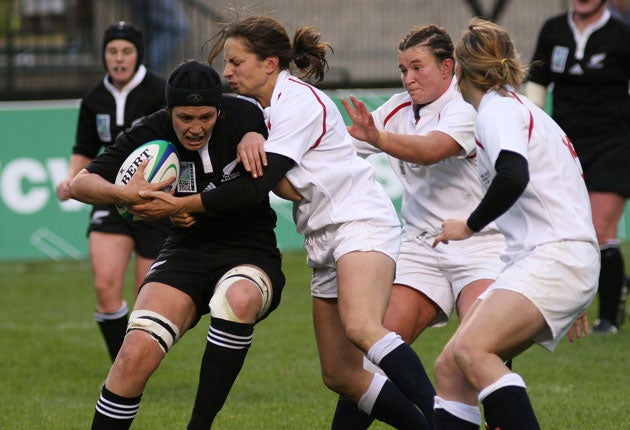The phenomenon of British rugby and its rising stars
More women than ever before are challenging the oval ball game's hard-drinking, macho image

Your support helps us to tell the story
From reproductive rights to climate change to Big Tech, The Independent is on the ground when the story is developing. Whether it's investigating the financials of Elon Musk's pro-Trump PAC or producing our latest documentary, 'The A Word', which shines a light on the American women fighting for reproductive rights, we know how important it is to parse out the facts from the messaging.
At such a critical moment in US history, we need reporters on the ground. Your donation allows us to keep sending journalists to speak to both sides of the story.
The Independent is trusted by Americans across the entire political spectrum. And unlike many other quality news outlets, we choose not to lock Americans out of our reporting and analysis with paywalls. We believe quality journalism should be available to everyone, paid for by those who can afford it.
Your support makes all the difference.Rugby, traditionally described as a game for hooligans played by gentlemen, is increasingly being taken up by women.
Female participation in the game has soared, and is expected to increase further as a result of the sport gaining Olympic recognition for 2016.
There are now more than 200,000 women and girls playing in teams around the world, with the number of girls' rugby clubs in England alone tripling in the past six years, from 87 in 2003 to 274 in 2009. The number of women over 18 playing regularly in England has gone up from 4,124 to 5,019 in the past two years, and the number of girls has risen from 5,961 to 7,925 in the same period.
Next year England will host the Women's Rugby World Cup for the first time. Unlike the men's team, which is ranked a paltry seventh, the English women are second in the world, with three Six Nations wins under their belt and a good chance of making the top spot by the end of the season.
In another first, next month will see the women's team walk out on Twickenham's hallowed turf against New Zealand shortly after the men's international. Experts believe the women's match is likely to be the more interesting of the two fixtures, with England attempting to oust the Kiwis as world number one.
Rosie Williams, the managing director of the Rugby Football Union for Women (RFUW), said: "We're going into a really exciting time for the women's game. When I began the job in 2002 there were hardly any girls playing – now it's everywhere. There's been a really significant increase in women's rugby players, but the most dramatic rise has been in the numbers of school-age girls playing. Having the World Cup in England and live on television next year will make it even bigger."
Despite the game's testosterone-fuelled image, women are finally being taken seriously, she argues. "Like cricket or soccer, the game has been dominated by men. Just because it's a contact sport, that doesn't mean it has to be butch; there has been a cultural change."
A website devoted to international women's rugby, ScrumQueens.com, has generated widespread interest since its debut two weeks ago. Its editor, Alison Donnelly, believes the game's recent success is due to its accessibility. "It's a great sport for girls to take up because it's really inclusive. Girls might be the wrong size or shape for other sports, but with rugby you need to be different sizes for different positions, so it's fine if you're tall or short, or even a bit overweight."
Emily Butler, 16, who plays for Beaconsfield Belles, says the club has seen a rapid boost in numbers. "My brothers played when I was little and I always wanted to try. Last year we had 15 players and now we've got around 35."
Charlotte Barras, 27, the England winger, says the women's game has changed immeasurably since she started.
"It wasn't until university that I got to play properly. Now there are community development officers who are delivering rugby to girls around the country and the grass-roots has improved dramatically.
"I think people are surprised when they see us play now, they're shocked by how physical the game is and how athletic we are."
Join our commenting forum
Join thought-provoking conversations, follow other Independent readers and see their replies
Comments